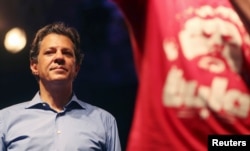Far-right Brazilian presidential candidate Jair Bolsonaro vowed on Tuesday to appoint non-partisan ministers, breaking with the tradition of building cabinets through coalitions, as part of his bid to tackle graft in Latin America's largest economy.
Bolsonaro, a conservative congressman favored by financial markets, fell just short of an outright majority in Sunday's vote. He will face leftist Fernando Haddad, a former Sao Paulo mayor, in a second round ballot on Oct. 28.
With a commanding lead in the first round — he won 46 percent of the vote to Haddad's 29 percent — and a tidal wave of support lifting his congressional allies, Bolsonaro says he has the capital to fundamentally change the political process.
That would start with a more technocratic cabinet, potentially led by another conservative congressman, Onyx Lorenzoni, Bolsonaro said in a video posted on social media with Lorenzoni by his side.
"Once we get there, let's build a team of ministers committed to the future of Brazil and not political and partisan interests," Bolsonaro said. "And who knows, Onyx here as chief of staff in Brasilia, OK?"
The 63-year-old former army captain has said he would like to appoint several generals to cabinet posts in an effort to depoliticize senior government roles and root out corruption schemes exposed by huge graft investigations in recent years.
Without senior cabinet posts to secure allied parties, however, the right-wing firebrand could struggle to keep a governing coalition together in a more fragmented Congress that will be divided between 30 parties next year.
Bolsonaro is also looking to put business leaders in government roles, a newspaper reported on Tuesday, including a possible invitation to the head of global markets at Santander Brasil SA to lead the central bank if current governor Ilan Goldfajn declines to stay on.
Roberto Campos Neto, who also runs the trading desk of Santander Brasil, is one of several executives being considered to run ministries and state enterprises, Folha reported without saying how it obtained the information.
The newspaper also reported that Alexandre Bettamio, chief executive for Latin America at Bank of America Corp, could take over as CEO of state-run lender Banco do Brasil SA.
The Bolsonaro campaign did not immediately respond to a request for comment. Neither Campos Neto nor Bettamio could be immediately reached for comment.
Haddad, in a radio interview, would not reveal who he is considering for his cabinet if he wins the second-round vote, but he said the finance minister would "not be a banker."
Brazil emerged last year from its deepest economic recession in decades, which wiped out much of the prosperity generated during the previous decade when the country was a darling of emerging market investors.
Market-friendly conversion
Roberto de Oliveira Campos, a grandfather of the Santander Brasil banker, served as planning minister in the early years of Brazil's 1964-1985 military government, when pro-U.S. views and free-market policies earned him the nickname "Bob Fields."
Bolsonaro, an outspoken apologist for the dictatorship, in the past defended nationalist, interventionist economic policies with which the military government spurred an inflationary economic boom in the 1970s, after Campos left the government.
Since Bolsonaro launched his presidential campaign, he has declared his conversion to more market-friendly policies advocated by his main economic advisor, University of Chicago-trained banker Paulo Guedes.
Guedes told Reuters in the past that Bolsonaro could invite Goldfajn, a former executive at the nation's largest private-sector bank, Itau Unibanco Holding SA, to continue leading the central bank.
However, Goldfajn has strong ties to the Brazilian Social Democracy Party (PSDB), formerly Brazil's most important right-of-center party, which has lost space to Bolsonaro's more hard-right Social Liberal Party (PSL).
According to the Folha report, Bolsonaro has not yet issued any formal invitations and would only do so once he is elected, but he is considering the appointment of executives that have advised his campaign.
Folha cited João Cox, chairman of telecom TIM Participações SA; Sergio Eraldo de Salles Pinto, an executive at investment firm Bozano Investimentos, which Guedes founded; andMaria Silvia Bastos, former president of state development bank BNDES and now head of Goldman Sachs in Brazil.
The executives could not immediately be reached for comment through their companies.






